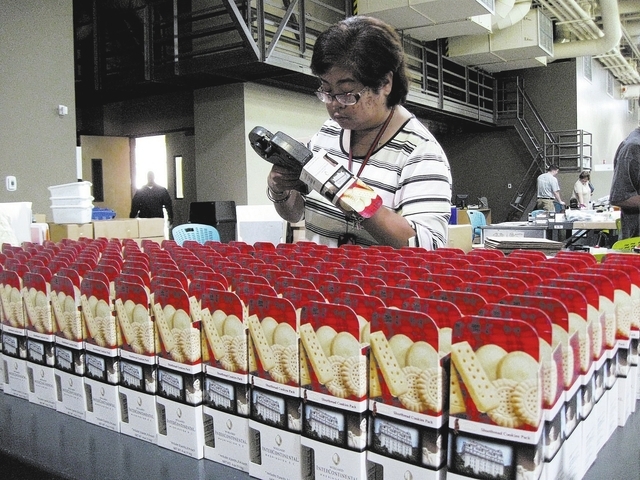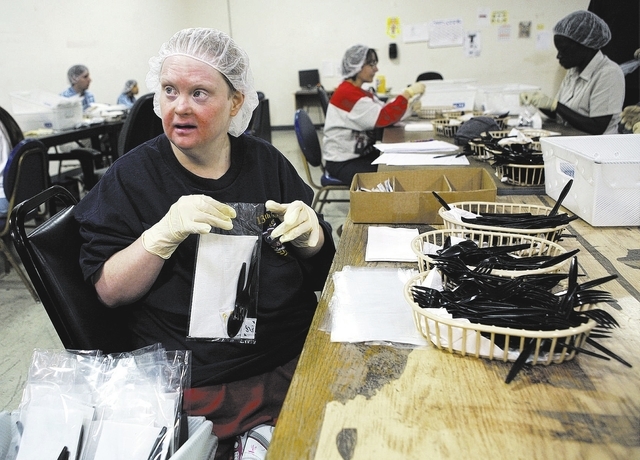Opportunity Village and other Las Vegas charities face major funding cuts
A tough job is about to get tougher.
Federal funding cuts are looming for local nonprofits that help severely disabled and elderly adults find work or stay out of nursing homes. Charity executives say the cuts are an unintended consequence hidden deeply in a maze of proposed Medicaid regulations changes.
Even Nevada’s Congressional delegation is intervening: It sent a letter to federal officials noting concerns that the rules would “have the effect of eliminating or severely restricting long-standing and award-winning programs” that focus on the disabled.
Here’s what the concern is about:
A Reagan-era rule waived some Medicaid regulations so people in need could get outpatient services in community centers and groups rather than just as nursing home patients. But in an effort to standardize Medicaid rules across agencies and communities, those waivers are on the chopping block. Among the proposed tweaks are changes in what counts as job-related services, and codes that would bar community-based care from happening next door to an institution such as a hospital. The rules were supposed to take effect Oct. 1, but have been delayed until afterJan. 1.
The revisions would hit hard some of Southern Nevada’s best-known charities.
At Opportunity Village, Executive Director Ed Guthrie said the group gets $2 million a year to provide training and jobs for 200 of its most severely disabled clients. Sixty percent of the funding, or $1.2 million, comes from Medicaid, thanks to waivers. The state ponies up the rest. With those funds, Opportunity Village hires people that have suffered substantial traumatic brain injury, cerebral palsy and other conditions. Workers assemble and package playing cards and coffee service for hotel-casinos and convention centers.
It’s not all about jobs: Some nonprofits provide adult daycare to keep the elderly and disabled out of nursing homes. That’s the mission at Nevada Senior Services, which offers everything from dance sessions to drawing classes, plus counseling and stress-reduction programs for caregivers of family members with Alzheimer’s disease. About $400,000 of the group’s $2 million budget comes from Medicaid waivers, said president and CEO Jeffrey Klein.
CEO Brian Patchett said Easter Seals Nevada relies on the waivers to help 80 people a day through its adult daycare program, which takes people with severe intellectual, psychiatric and behavioral issues on field trips to casino buffets, bowling alleys, museums and national parks.
Curbing the waivers would take away nearly two-thirds of Opportunity Village’s funding for the severely disabled, and that would only hurt society’s most vulnerable people, Guthrie said.
“The waivers allow us to provide them the support they need to be successful in employment. It allows them to feel the pride and purpose that come with earning a paycheck,” he said. “They have a reason to get up in the morning. They can go to work like everyone else, and see their friends on the job. They need someone to provide them with support and supervision. So if they’re not able to come to Opportunity Village, then mom or dad has to leave their job. What does that do to the economy? And what does it do to a family?”
Klein and Patchett said they’d have to cut services to 30 percent of their clients.
“It’s very rewarding to see them get excited and happy about engaging in the community,” Patchett said. “We would hate to see that go away. Imagine the most significantly disabled person you’ve ever met. That’s who we’re serving in these programs. These services are critical to folks who have kids with disabilities. We want to see them in the least-restricted environment possible.”
The proposed rule against offering community-based services next door to a hospital is especially bitter for Easter Seals and Opportunity Village. Easter Seals has been at its current location, 6200 W. Oakey Blvd., since the 1970s, and Opportunity Village has operated at 6300 W. Oakey Blvd. since 1991. Now, both nonprofits are concerned the new Rawson-Neal Psychiatric Hospital, which opened next door in 2010, will disqualify them from offering publicly financed services.
Athough Nevada Senior Services doesn’t have an institution next door, its mission could still suffer because the rules could prohibit it from offering a geriatric clinic, an in-home health agency and a physical therapy center on one campus.
“It’s the exact opposite direction we want to take things. We want to remove barriers to people receiving assistance,” Klein said.
On top of asking Nevada lawmakers for help, the groups have sent letters about the proposed rules to the U.S. Department of Health and Human Services. Guthrie said Opportunity Village sent comments to federal officials in 2010, 2011, 2012 and 2013, but the nonprofit never heard back on the rationale behind the changes, or if they can be pared back. Nor has the Congressional delegation gotten a response to its Sept. 24 letter.
That leaves nonprofits scrambling to make up the potential deficit. Their first plan of attack will be to ask the Nevada Legislature to fund the difference. That won’t be easy, because state budgets remain tight, Klein said. Donors would be the next option, but with unemployment stalled above 9 percent, it will be hard for locals to come up with the funds, he added.
That would leave one last resort.
“If we can’t find donors to help, we’re going to have to send people home,” Guthrie said.
That’s an even worse fiscal decision than keeping waivers alive, Klein said. Without adult daycare, Nevada Senior Services’ clients could end up in nursing homes, where the care is 24-7 and considerably more expensive. Adult daycare costs 20 percent to 30 percent of what a nursing home costs, Klein said. A 2011 MetLife study pegged the average daily cost of a semi-private nursing-home room at $206 a day.
It’s one more reason local nonprofits are anxious over the proposed regulations.
“Nobody has presented a compelling argument to show things are so bad that we need to make a change,” Guthrie said. “We just have some people who think they’re visionary who are going to impose their vision on other people.”
Added Klein: “There’s no replacement (for funds) in place. It would put a lot of people in institutions.”
Contact reporter Jennifer Robison at jrobison@reviewjournal.com. Follow @J_Robison1 on Twitter.





















